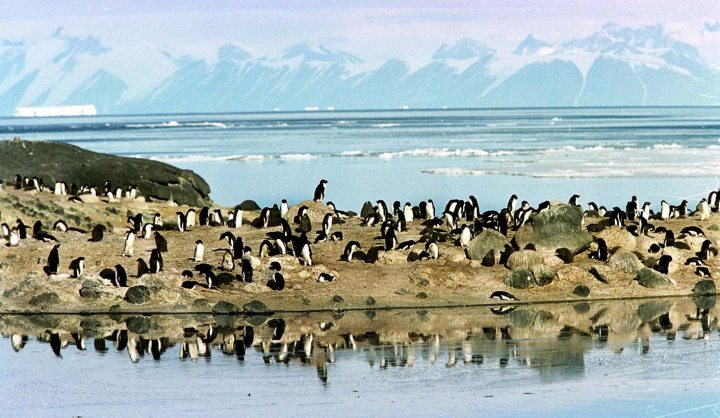World
Earth’s climate: ‘Abrupt change is already underway’

For years now, people have argued over both the reality and nature of climate change on our Earth. Scientists, mostly, have increasingly argued the preponderance of evidence points strongly towards a significant change in global climate in the offing. Meanwhile, politicians, mostly, have argued it isn’t happening, and, anyway, if even it is, it is not from the hand of mankind. Now a high-level American scientific body, the National Research Council, has thrown its full public weight behind the fact of climate change. In the process, it has urged carrying out the right kinds of research – and some key actions – to come to grips with this looming reality. By J. BROOKS SPECTOR.
In America, at least, the battle over climate change has sometimes seemed like a deeply ideological struggle reflecting larger political issues. On the one hand, people like the late President Ronald Reagan once tried to argue global warming was primarily the fault of trees (sometimes he blamed cows too). On the other hand, those with a much different view like former Vice President Al Gore of An Inconvenient Truth fame insisted global warming was about to send the oceans crashing over the buildings of every coastal city on Earth. From that perspective, documentaries about the fate of polar bears that had no sea ice left to hunt from were a signifier for our fates just a little further down the road.
But earlier this week, a major scientific panel sponsored by the National Research Council (NRC) issued a warning that continued global warming posed a risk of rapid, drastic changes in human and natural systems. They pointed to key developments – the possible collapse of polar sea ice, the potential for a climate-caused mass extinction of plant and animal life, and the imminent threat of immense dead zones in the ocean – that really would be catastrophic. The NRC is a Washington-based non-profit body that frequently oversees studies on key scientific questions. In this case, several federal government agencies commissioned this NRC study.
Commenting on this new report, the New York Times noted that a decade earlier, “In 2002, the National Academy of Sciences published “Abrupt Climate Change: Inevitable Surprises,” a valuable report examining whether and how the building human influence on the climate system might lead to disruptive jolts. The most important finding, in a way, was that this was an area sorely in need of intensified research. Most of the ‘monsters behind the door,’ to use an apt phrase from Stephen W. Pacala of Princeton, were plausible rather than probable. There were signs they’d escaped before (evidence of past abrupt changes), but only faint scratching could be heard now. Now there’s a new report from the Academy’s National Research Council. The title reflects advances in understanding: ‘Abrupt Impacts of Climate Change: Anticipating Surprises.’ The findings laid out below reinforce the reality that the biggest impacts of greenhouse-driven global warming still lie several generations in the future.”
The report itself notes, “Abrupt change is already underway in some systems [such as summer Arctic sea ice and extinction rates], and large scientific uncertainties about the likelihood of other abrupt changes highlight the need for further research. However, with recent advances in understanding of the climate system, some potential abrupt changes once thought to be imminent threats are now considered unlikely to occur this century.”
Having said all that, they also took the position that some of the most cataclysmic threats now being talked about – including a sudden upwelling of methane from the bottom of the oceans that could fry the planet or a shutdown of the heat circulation cycle in the Atlantic Ocean that would freeze nearby land areas (as in the 2004 movie, The Day After Tomorrow) – are not especially likely. At least not yet, anyway. Feel reassured.
In response to those things it did accept as worth being concerned about, the NRC’s scientific panel has urged establishment of an early warning system to alert the world well before such developments would lead to global chaos. In fact, the panel has asserted that some nasty climate surprises have already happened, others seem to be coming our way, and still others are inevitable, perhaps within just a few decades. Despite these impending crises, the panel warned very little has actually been done to prepare us for the impact of such things. Paleoclimatologist James WC White, the scientist who headed up the NRC’s committee, commented, “The reality is that the climate is changing. It’s going to continue to happen, and it’s going to be part of everyday life for centuries to come — perhaps longer than that.”
Is it time to invest in beachfront property while it is still way, way inland? The NRC panel’s position is that while climate change due to the human-caused release of those greenhouse gases – the ones that help keep solar energy from radiating away from Earth back into space – is now inevitable, the scientists are hoping these changes will happen slowly enough society can adapt to many of them. However, this new report also considers whether some of the changes the panel identified could happen so suddenly they could lead to profound social or environmental stress, even societal collapse. Despite dismissing some of those scarier scenarios, the panel did argue some risks are very real – and more important, perhaps, – some have actually begun already.
For example, the mountain pine beetles in the western part of North America are no longer are killed off by the annual winter cold. As a result, the beetles have now attacked millions of hectares of forest producing devastation to those forests that is so severe the results can be observed from space. Similarly, the decline in summer sea ice in the Arctic has been taking place even faster than scientists had originally predicted. (The Russians, among others, are now betting on just that eventuality in order to plan further exploitation of mineral resources.) The disappearance of the sea ice in summer in the next several decades would have severe impacts on the wildlife and human societies of the region – and unknown, unpredictable impacts on global weather patterns.
The panel added that one of the greatest risks is that such climate change will provoke what is effectively the sixth great extinction in Earth’s geological history – but without an asteroid to help it along. According to the panel, for example, many of the world’s coral reefs, ecological zones that are vital sources for fish that feed many millions of people have already reached – or are just about to – their tipping points and they seem doomed to collapse within a matter of decades.
The New York Times noted that small changes could have huge effects. As the paper wrote in reference to the NRC report, “…Katrina’s high waters just made it over the levee, and the difference between ‘just over’ and ‘not quite over’ proved to be a lot of billions of dollars and human disruption. The Arab Spring surprised many people, including some who had expertise, and while attribution of such an event to a particular cause is probably impossible, there are people (as written up in The Economist, for example) who link at least some of the causation to food prices, and there in turn people who link at least some of the food-price swings to climate change. It is easy to see such linkages occurring, and strengthening, in a greatly warmed future climate when many of our crops are already grown at temperatures above their optimum.”
Other equally scary but possible disasters would be the rising heat in the upper ocean zones that would significantly reduce oxygen in the deep reaches of the oceans. The worst-case possibility would be to create vast zones of water with too little oxygen for most sea creatures to survive. This, in turn, would have unfathomable outcomes for the overall ecology of the ocean.
On the other hand, the panel did decide that while the collapse and disintegration of the West Antarctic ice sheet, an area thought to be particularly susceptible to the effects of a warming ocean, would significantly raise the sea level, in the near term at least, such an outcome is “unknown but probably low.” Whew. Dodged at least one bullet, there.
But the key question of how to monitor these major changes remains unresolved, even if one agreed that the climate change naysayers have an argument on their side of the divide. Still, with the preponderance of scientific opinion now firmly on the side of the reality of climate change, it would seem to be foolish not to pay much closer attention to the evolving changes – and to attempt to figure out how to respond to them. Such a monitoring system would be part of an overall risk management strategy. It would generate information for hazard identification and risk assessment and such data would help identify vulnerabilities to assist in designing risk mitigation as well as preparedness efforts and to ensure warnings produce protective actions to pre-empt larger catastrophes.
There is already significant experience in such passive systems with efforts like the National Integrated Drought Information System or the Famine Early Warning System. Moreover, “Research has helped us begin to distinguish more imminent threats from those that are less likely to happen this century,” said James WC White. He adds, “Evaluating climate changes and impacts in terms of their potential magnitude and the likelihood they will occur will help policymakers and communities make informed decisions about how to prepare for or adapt to them.”
Interestingly, major American companies are already planning how to cope with policies like carbon taxes in their business planning, regardless of immediate government action or inactivity on climate issues. A new report by the environmental data company CDP notes some twenty-nine companies, even some whose leadership have close ties to Republicans, including ExxonMobil, Walmart and American Electric Power, are already putting such a tax in their long-term financial plans.
And for the naysayers and climate change denialists, here’s one little straw in the wind that should give you some pause. A year ago, the CIA announced it was disbanding the office it had set up four years earlier to monitor climate issues as key determinants of societal upheavals that could threaten American – and even global security. The CIA was apparently bowing to congressional critics (and budget cutters) who remain harsh opponents of any recognition by the government of the possibilities of climate change.
In response, a sceptic would only note that this is the same CIA that, historically, failed to predict the Soviet-China split, the collapse of the Shah of Iran’s power, the collapse of the Soviet Union, and the liberation of Eastern Europe – and more recently, the Arab Spring. And so, if the CIA has elected to no longer take climate change seriously enough to maintain a separate office to monitor such things – that should be proof enough that we’re virtually at the tipping point for climate change already. DM
Read more:
- Panel Says Global Warming Carries Risk of Deep Changes at the New York Times;
- An Update on Risks of Abrupt Jolts from Global Warming at the New York Times;
- Abrupt Impacts of Climate Change: Anticipating Surprises at the National Academy of Sciences;
- Dangerous Global Warming Closer Than You Think, Climate Scientists Say at Scientific American magazine;
- Tipping Points: Where May Abrupt Impacts from Climate Change Occur? At the Science Daily;
- Large Companies Prepared to Pay Price on Carbon at the New York Times;
- CIA closes dedicated climate change unit at the AFP (via Google)
Photo: A colony of Adelie penguins settled on a rocky spur above ice melt pools gather in front of the Ross Sea ice shelf in Antarctica January 27, 1999. (Reuters)




















 Become an Insider
Become an Insider